Reading Time: 10 mins
Is Professional Networking All It's Cracked Up To Be?
Networking might help you find "a hidden job market". But why is it hidden in the first place?
This is Part 2 of a six-part series where I discuss:
😩 Why it’s hard to find a job right now
🤝🏼 Networking in 2024
🎲 Interviews vs. mind games
🦄 The myth of the ideal candidate
💔 Rejection emails (coming soon!)
🧠 Mental health tips (coming soon!)
Eight years ago, I worked at a growing company that was hiring like crazy with no signs of slowing down.
One day I found myself standing shoulder-to-shoulder with 10 new hires in the elevator, inhaling 10 pungent colognes on my way out of the building, when I saw something that broke my heart. An elderly gentleman was trying to leave his resume at the front desk.
“I’d just like to be considered,” he pleaded as the receptionist proceeded to call security. Turns out, this man just dropped by to inquire about a job opportunity—and he couldn’t understand what the problem was. He’d walked in wearing a suit, printed out his CV, took an hour-long bus ride to submit his application, and figured he would stand out by showing up in person.
Back in the day, this used to be “professional”. But to everyone else now, he seemed “crazy”. Because, in all honesty, who does that anymore? This was nearly a decade ago—but it still feels like something out of a Charlie Chaplin film.
The digitization of work has single-handedly changed the way we network, find job opportunities, and relate to each other as humans. But is it possible that the pendulum has swung so far in the other direction that we forgot why we digitized the process in the first place?
Winners and losers
Online or offline, job-hunting is seen as a cut-throat competition. Win or lose. Tough luck.
But unlike most competitions, the rules and expectations get murkier each day.
In a sense, the real winners aren’t those that land the job, but the ones that land the job perfectly suited to their unique skills and career aspirations. Because that’s when the win is truly meaningful in the long run.
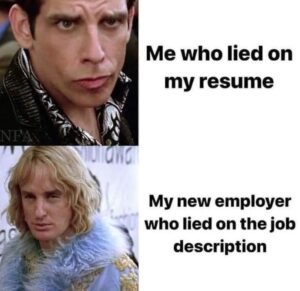
But in spite of our reliance on digital tools like ATS (which forces you to write for a machine rather than a person), great candidates don’t “win” as often as you might think.
➡️ Hiring managers may have an exceptional candidate under their nose and inadvertently skip their application due to something as insignificant as a custom font.
➡️ An exceptional candidate may settle for a low-ball offer because it’s the only offer on the table in an excruciating 9-month job hunt.
The fact of the matter is that “the perfect match” actually requires less machine-intervention and more imagination and discernment on both sides of the hiring table. This is what makes the selection process truly humane—the ability to transcend the limitations of a resume and cover letter. Not a tool that reduces the human experience to a bunch of keywords.
Go the other way and totally abandon the technology—and now you’re relying a little too much on the familiar faces in your little bubble. Say hello to nepotism, discrimination, favoritism, and racial, gender, and cultural bias.
It’s clear that the answer lies somewhere in between.
The hidden job market
Whether you enjoy networking or it makes your insides hurt, connections matter. Especially to people at the top. Professional recruiters and career consultants know this, which is why they’re constantly encouraging applicants to tap into “the hidden job market” to get a leg-up in the competition.
Here’s how executive coach Carolina Ceniza-Levine describes it:
“The ‘hidden job market’ refers to jobs that are not publicly posted and are filled by word-of mouth (including an external recruiting agency scouting for candidates without naming the company).”
Why is it hidden, you ask?
For a host of reasons that include saving the company’s time and resources, protecting the company’s reputation (so competitors and customers aren’t aware of an empty seat in a leadership role), managing an internal crisis (looking to replace someone while they’re still working for the company), having a strong referral, already having an internal candidate in mind, etc.
To take a fictional example, in Season 3 of The Office, Michael gets a call from the CFO about a “corporate position” in New York. He thinks he’s got it in the bag except he has no idea the role he’s interviewing for will replace his current boss.
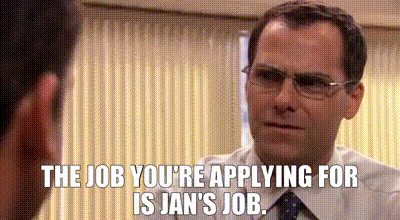
This is where networking helps. Who know and how you know them becomes more important than your actual skills, qualifications, and experience. Being in touch with “the right people” at “the right time” makes it easier to access these unadvertised opportunities, giving you a significant advantage in the job market.
But there’s a dark side to this seemingly cost-effective approach to hiring.
An obvious one is the exclusion of fresh talent, people who are new to the city, or those from marginalized communities with limited access to the upper echelons of corporate society. I’m talking immigrants, as well as racial and gender minorities looking to move up in male-dominated industries.
And then you have introverts who prefer to keep a low-profile and thus lose out on “exclusive” opportunities to prove themselves to senior leadership.
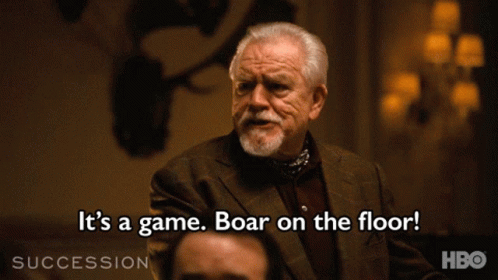
Employers might think this isn’t their problem. But it actually shapes the organizational culture in ways we don’t realize.
For one thing, relying exclusively on the “hidden job market” means you’ll probably be hiring more of the same kind of people, which may lead to higher levels of groupthink, conformity, one-dimensional ideas, and a general lack of diversity both in thought and people. This is exactly why white candidates are more likely to get hired through employee referrals, according to a study by consulting firm Paradigm. Global diversity and business leader Doug Melville goes on to explain:
“The simple truth is this: the best candidate doesn’t always get the job. The best candidate interviewed, from the perspective of leadership and decision-makers, gets the job. And many times, those who are related to leadership fit that bill.”
Transactional relationships
Of course, important hires aren’t always related to leadership. But we can all agree that even a vague connection to the hiring manager can help you skip the long queue.
Networking in 2024 is all about building these types of transactional relationships. In fact, this is normalized every day on platforms like LinkedIn, with many likening it to “deposits” and “withdrawals”.
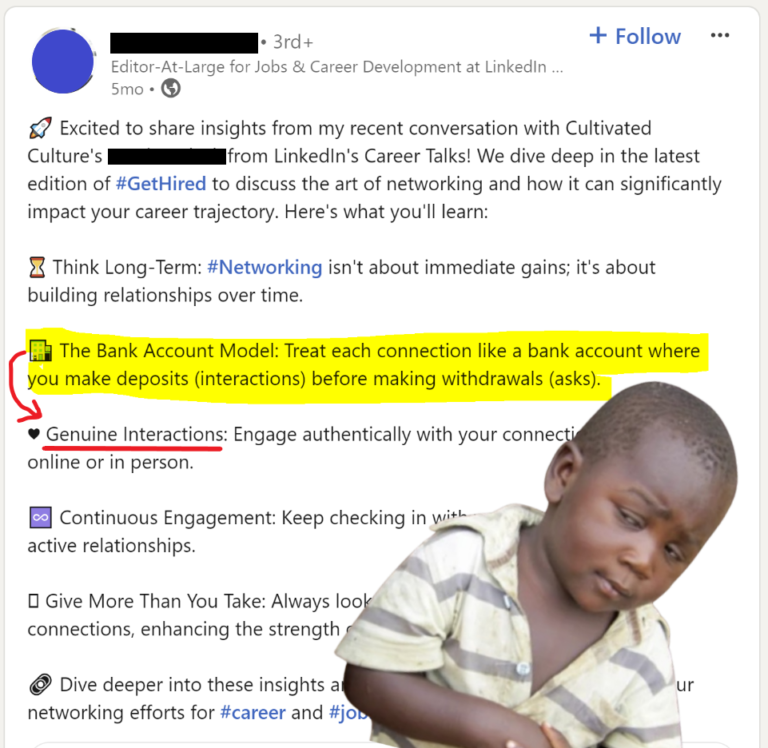
Doesn’t get any more transactional than a goddamn bank metaphor
The problem with this kind of thinking is there’s always strings attached. You’re doing something now with the intention of cashing in later—which contradicts the very foundation of a “genuine interaction”.
It’s kinda icky. 🤷🏿
For employers, hiring the “deposit” candidate versus the qualified one (simply because you owe one), may even lead to long-term organizational issues, such as silos, bottlenecks, poor decision-making, inefficiencies, low revenue, mistrust, low morale, and unexpected turnover. Unless they’ve personally worked with the candidate in the past, it could also threaten the reputation of the hiring manager.
It’s expensive and risky on all fronts. Yet it happens ALL the time.
These “deposit” employees are often onboarded with pomp and splendor, particularly at the senior management level, where they’re introduced to all parts of the organization, giving them the power to inadvertently erode organizational culture. Read: toxic leadership.
In a way, this is equally damaging for the love-to-hate employee because it enables them to do something they’re clearly not cut out to do. It creates a breeding ground for delusional thinking, which in turn becomes an impediment to self-discovery.
You might suck at people management but excel at pitching ideas, but you’ll probably never explore that now because you get to tell people, more qualified than yourself, what to do.
While it’s easy to hate on these folks, it’s important to note that toxic leaders are usually a product of toxic environments. Bob might be an asshole because he’s probably never had a manager that wasn’t one—and he may lack the emotional intelligence needed to challenge that line of thinking after 20 years in the business.
(Of course, that doesn’t change the fact that he’s an asshole. But ya know. Somethin’ to think about.)
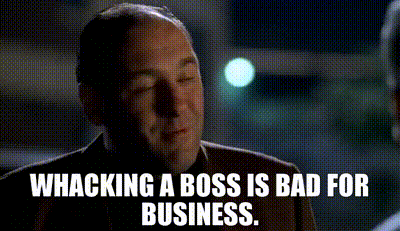
Monetizing your insecurities
If you feel like your professional networking efforts aren’t getting you anywhere, remember platforms like LinkedIn make a f$ck-ton of money off your unemployment status.
This SatPost substack walks into the valley of cringe to explain LinkedIn’s massive financial success against other social networks: “LinkedIn has turned into a pretty monster business: annual revenue is $10B+, which compares very favourably with other social networks like Twitter (~$5B), Snap (~$4B) and Pinterest (~$2-3B).”
Much of this success comes from feeding off vulnerable job-seekers who are constantly made to feel like they’re not doing enough. As if the hiring process is broken and somehow it’s your job to fix it.
A typical #careeradvice post includes at least one or more of the following gems:
➡️ Use the right keywords.
➡️ Hire a professional resume writer.
➡️ Grab my attention in the first 5 seconds.
➡️ Look up the hiring manager — no I won’t add their name in the post, show some initiative!
➡️ Shoot them a message.
➡️ No, don’t admit you stalked them — mention that mutual connection you’ve never spoken to.
➡️ Now don’t expect a response.
➡️ Always follow up with a thank you, show some goddamn gratitude.
➡️ Now don’t just wait, write back, remind them you’re still interested even though they have your name, street address, and social security number.
➡️ Don’t mention pay transparency, do you want to be disqualified?
➡️ Oh look, someone peeked at your profile, wanna see who it was? That’ll be $50. Fine, stay unemployed! Do you even want a job?!
In short: LinkedIn is weird. And it gets weirder the more seriously you take it.
Content strategist Fadeke Adegbuyi brilliantly sums up the absurdity of this alternative universe in the following words: “The depravity of a platform where HR Managers are the rockstars speaks for itself.”
It does indeed.
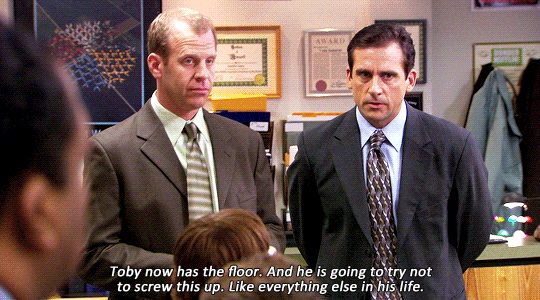
So far I've discussed the dangers of the hidden job market, the perils of using a bank account model to build genuine relationships, and gaslighting on professional networking platforms. But there are times when you hire through a referral because you really trust their judgment—and it works like a charm. Doesn’t that count for something? And what about people who get the job without any help from the inside? Isn’t the devil you know better than the devil you don’t?
Stay tuned for my NEXT post from this six-part series where I discuss job interviews, getting to know people organically—and mental health tips to get through it all!
Have some thoughts? Drop a comment below—and get notified when my next post is live!
